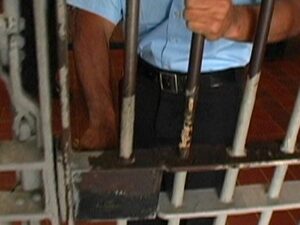 Contraband cell phones are big business in state and federal prisons. Unfortunately the only ones making money off the smuggled wireless devices are the corrupt guards and the prisoners who cell airtime to other prisoners. Clearly it is time to consider a different approach. One that co-opts the legitimate demand to stay in contact with loved ones and provides a secure cell phone service to reduce the contraband value of smuggled prison cell phones.
Contraband cell phones are big business in state and federal prisons. Unfortunately the only ones making money off the smuggled wireless devices are the corrupt guards and the prisoners who cell airtime to other prisoners. Clearly it is time to consider a different approach. One that co-opts the legitimate demand to stay in contact with loved ones and provides a secure cell phone service to reduce the contraband value of smuggled prison cell phones.
A correctional officer accused of smuggling cellphones and tobacco into a Northern California prison in return for cash payments made his first appearance in Sacramento federal court Friday.
Bobby Joe Kirby is charged in a criminal complaint filed June 17 and unsealed Thursday with wire fraud and depriving the state of his honest services.
Kirby, 53 and a resident of Reno, made his initial appearance in federal court there on June 23, but the case will be prosecuted in Sacramento. He is free on a $25,000 unsecured bond signed by his wife and him.
U.S. Magistrate Judge Dale A. Drozd set a preliminary hearing for July 29, but Kirby will be charged by grand jury indictment or by a prosecutor’s information before then.
Department of Corrections and Rehabilitation spokeswoman Terry Thornton said in an email Friday that Kirby is on paid administrative leave pending the outcome of the criminal case and the department’s own administrative review of the matter.
According to an FBI agent’s affidavit filed in support of the complaint, Kirby raked in thousands of dollars via wire transfers last year and this year as payment for his unlawful delivery of cellphones and tobacco products to inmates at the California Correctional Center in Susanville.
The Lassen County facility trains minimum-custody inmates for placement in one of the institution’s 18 Northern California camps. Working in tandem with the California Department of Forestry and Fire Protection, the camps provide fire suppression crews, as well as a labor force for conservation projects and other emergency response needs.
Associates of inmates, many of whom were on inmates’ lists of visitors, paid Kirby through MoneyGram, a service offering wire transfers of funds drawn on senders’ bank accounts or against credit or debit cards, FBI Special Agent Glenn Booth said in his affidavit. Using two aliases, Kirby picked up the money at a Walmart in Reno, Booth said.
The payments ranged from $20 to $450 and totaled more than $10,000, he said.
Booth said that to pick up the money Kirby used a code question with a predetermined answer that both he and the sender provided to MoneyGram. The sender’s question at times was “What is my dog’s name?” and Kirby’s answer was “Rocky,” the agent related in the affidavit. He said another code exchange was “What is my favorite color?” and the answer was “Green.”
Video surveillance cameras in the Walmart captured Kirby on visits there to collect the money.
The state paid Kirby $66,849, including overtime, in 2010 as a correctional officer.
Prison officials first got wind of Kirby’s alleged smuggling operation on Feb. 22, when an inmate at the correctional center asked to speak to a member of the investigative services unit. The inmate, identified only as “CI-1” in Booth’s affidavit, informed on Kirby in an interview conducted by correctional Lt. Brandon Harrington. The inmate said he was “hoping to minimize his pending punishment for possessing narcotics while in CCC,” according to the affidavit.
- Multi-Blockchain System for Inmate Forensics - April 2, 2024
- Blockchain to Secure Attorney-Inmate Privacy for Prison Calls - June 28, 2023
- meshDETECT® Announces Grant of Ninth Patent For Blockchain Wireless Services - August 26, 2022
